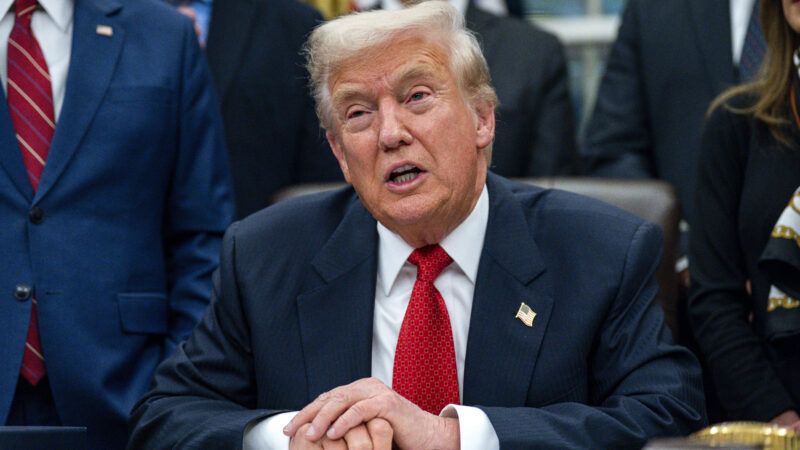Trump Is Right: That BBC Documentary Misquoted Him
His lawsuit against the BBC is likely frivolous, however.

Fresh off his legal victories over several U.S. media companies, President Donald Trump has now set his sights on the British Broadcasting Company (BBC). Trump has threatened to file a billion-dollar lawsuit against the BBC for allegedly defaming him.
You are reading Free Media from Robby Soave and Reason. Get more of Robby's on-the-media, disinformation, and free speech coverage.
For a variety of reasons, the prospect of Trump winning such a lawsuit is extremely doubtful. But not for nothing, the BBC clearly made a mistake, and should apologize and correct it.
Here's what happened: The BBC aired an episode of its program Panorama that included coverage of Trump's speech to his followers at the Ellipse in Washington, D.C., on the afternoon of January 6, 2021. The BBC aired only a few seconds of his hour-long speech, and included the part where Trump said: "We're going to walk down to the Capitol and I'll be there with you…and we fight. We fight like hell."
Unfortunately, that was a bad edit. In actuality, Trump said the first part, "we're going to walk down to the Capitol" and "I'll be there with you," about 54 minutes before he said that second part, "and we fight. We fight like hell." For a closer look at the differences, The Guardian has a useful side-by-side video.
Journalists often shorten quotes in order to save time, though the intention should never be to alter the meaning of what the quoted person was saying. In this case, the edit is definitely problematic. By moving up the "we fight like hell" clause, the BBC made it sound like Trump's very specific call to walk to the Capitol also included a call to "fight like hell," which could be understood as a call for violence.
This meaningfully alters what Trump had said, in a manner that comes much closer to meeting the legal definition of incitement. As Reason's Jacob Sullum has explained, speech that merely advocates lawlessness is protected by the First Amendment unless it is likely to provoke lawless action and is also "directed" at achieving such a result. Trump's instructions to the January 6 mob may have been reckless and unwise, but he did not direct his followers to engage in lawless action—indeed, he said they should march "peacefully and patriotically." Juxtaposing the "fight" clause so that it is uttered right after his call to march has the effect of making Trump's comments much more sinister.
Given that the U.S. House of Representatives impeached Trump for inciting an insurrection—the Senate acquitted him—editing the speech in this manner was a highly relevant error. Note also that the edit was seamless—too seamless, really. If the BBC had spliced the clips together but displayed time stamps that explained these two remarks actually did not occur back-to-back, the outlet could have covered itself. But no one casually watching the documentary would have noticed that 54-minute jump forward in time.
The BBC should apologize and fix the error. It should not have to shell out a billion dollars, however.
For one thing, Trump has threatened to bring the suit in Florida rather than the U.K., since the statute of limitations has already expired in the latter venue. According to The New York Times, however, it's not clear whether the documentary ever aired in the U.S. Moreover, libel law in the U.S. is friendlier to the defendant than laws in the U.K., owing to our stronger First Amendment protections. Trump would have to demonstrate "actual malice," which would mean proving not just that the BBC made a mistake, but that the mistake stemmed from a conscious desire to wrongly harm him or a recklessness so pathological that harm should have been anticipated. In other words, the wrongness has to have been deliberate, or effectively deliberate. Lastly, Trump would have to show that his reputation actually suffered as a result.
Those are high bars to clear, and rightly so. Media outlets should not be sued out of existence every time a political figure is mad at them. But when journalists make mistakes, as they did in this case, they should own up to it.
This Week on Free Media
I am joined by Amber Duke to discuss Candace Owens, 50-year mortgages, and whether Rep. Alexandria Ocasio-Cortez (D–N.Y.) is going to run against Senate Minority Leader Chuck Schumer (D–N.Y.). Subscribe to Free Media on YouTube!
Worth Watching
I finally finished Donkey Kong Bananza, which has a rather thrilling final act. I won't spoil it, in case there are any huge Donkey Kong fans reading this who have yet to play it (which seems unlikely, but you never know).


Show Comments (62)